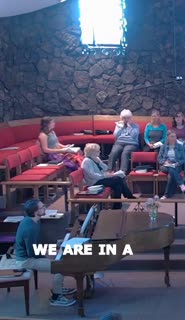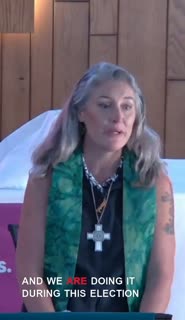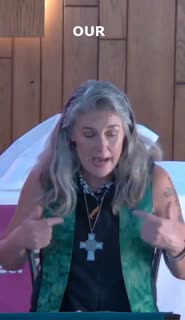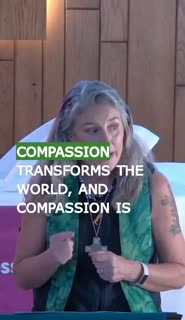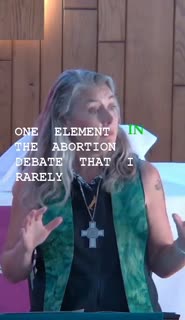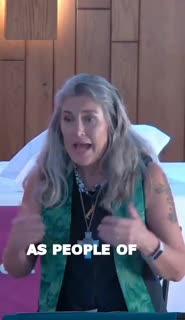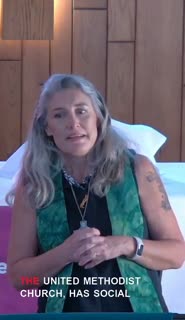Embodying Compassion: Navigating Complex Social Issues Together
Devotional
Sermon Summary
Bible Study Guide
Sermon Clips
1. "We are in a worship series called Do Unto Others, Do Unto Others, that God calls us to kindness and compassion all the time, even in our politics. And so we start with peace across the divide. The thing I am saying is, I'm curious, what if I had had fear and fear? I would not have said that I'm saying, I'm going to take a deep breath here. Three words. Three words. The rhythm of our breath and our heartbeat is the same. Our desire for life and love is the same. Our desire for a peace in which we all flourish is the same. Let this moment permeate our souls and let us share the peace of Christ." [09:43] (116 seconds)
2. "And we are doing it during this election season. We are 17 days from the election. And we're looking at Jesus' command to do unto others. And it is challenging. This is a challenging teaching in today's climate. And following it speaks volumes about what it means to be Christian. Last week, my son said to me, you know, you never really came to a conclusion. Because we're talking about politics, and I think he was listening for, and therefore you should vote. And so I told him, I'm not going to do that. That the goal of this, the goal of what we're doing, is not how to vote, but how to be compassionate. How we are to approach our political life." [23:17] (57 seconds)
3. "Our compassion grows as we learn about ourselves, as we learn about others, as we strive for understanding. And faithful discipleship does not mean that we are conflict free, or anxiety free, or that we never have discomfort. In fact, I would say faithful discipleship guarantees discomfort at the minimum. But it means that we have a compassion that transforms us, and transforms the world. Today we're going to talk about compassion regarding women's health and abortion. 50 % of you when we did the survey said this was an important issue to you." [26:35] (42 seconds)
4. "One of the foundations of compassion is that we listen for understanding rather than demanding that our preferred language be used, and it can be uncomfortable. So I am asking for compassion, for compassionate listening, for compassion around women's health and abortion. So I'm going to use identity language, which means whatever people call themselves, that's the language I'm going to use. So some people are pro-life. They oppose legalized abortion. They see abortion as the killing of a baby. In the removal of that pregnancy that there is a baby and the act of abortion kills that child." [29:27] (48 seconds)
5. "Compassion transforms the world, and compassion is the key to success. It is good to support lots of people is always about real people, not ideals. So I want to share a few stories about real people I have known faced with this decision. One was a co-worker 15 or 20 years ago. She was pregnant with her second child. They were so excited. And then about five or six months along, they discovered that she was carrying conjoined twins. Conjoined twins that shared organs. And the doctor said there was no way that they would survive after birth." [34:57] (41 seconds)
6. "Well, one element in the abortion debate that I rarely hear addressed is the role of poverty. Actually, poverty, financial reasons, is the number one reason people give for having abortions. 75 % of women who seek abortion are low income. 59 % are already mothers and already carrying the financial burden of raising a child. Overwhelmingly, people who seek abortion lack paid maternity leave and they lack affordable contributor. They lack affordable sounds, they lack affordable access to healthcare, child care, only 3 % of all people who seek abortions say it's because they don't want children." [40:45] (46 seconds)
7. "As people of faith, as people of compassion, we may not ignore the bigger picture, that we care about the reasons people seek abortion. We care about their grief. And if we are pro-life, are we forcing women into deeper poverty and their children along with them? If we are pro-choice, are we forcing women into terminating a pregnancy not because it's their heart desire, but because poverty leaves them with no options? Compassion transforms the world. As people of faith, as people of compassion, we must take seriously the role of poverty." [42:46] (52 seconds)
8. "The United Methodist Church, has social principles. So for those of you who are saying, I want a conclusion, the social principles maybe get a little closer, not a lot closer, but they do address abortion. They address abortion as a social issue, not a personal choice, not a personal issue. Abortion and reproductive health are in the same area. It's addressed along with family, human sexuality, marriage, substance abuse, bullying, colonialism. And it begins with the sacredness of life. The social principles say our commitment to the sanctity of human life makes us reluctant to condone abortion." [44:00] (51 seconds)
Ask a question about this sermon
2. "And we are doing it during this election season. We are 17 days from the election. And we're looking at Jesus' command to do unto others. And it is challenging. This is a challenging teaching in today's climate. And following it speaks volumes about what it means to be Christian. Last week, my son said to me, you know, you never really came to a conclusion. Because we're talking about politics, and I think he was listening for, and therefore you should vote. And so I told him, I'm not going to do that. That the goal of this, the goal of what we're doing, is not how to vote, but how to be compassionate. How we are to approach our political life." [23:17] (57 seconds)
3. "Our compassion grows as we learn about ourselves, as we learn about others, as we strive for understanding. And faithful discipleship does not mean that we are conflict free, or anxiety free, or that we never have discomfort. In fact, I would say faithful discipleship guarantees discomfort at the minimum. But it means that we have a compassion that transforms us, and transforms the world. Today we're going to talk about compassion regarding women's health and abortion. 50 % of you when we did the survey said this was an important issue to you." [26:35] (42 seconds)
4. "One of the foundations of compassion is that we listen for understanding rather than demanding that our preferred language be used, and it can be uncomfortable. So I am asking for compassion, for compassionate listening, for compassion around women's health and abortion. So I'm going to use identity language, which means whatever people call themselves, that's the language I'm going to use. So some people are pro-life. They oppose legalized abortion. They see abortion as the killing of a baby. In the removal of that pregnancy that there is a baby and the act of abortion kills that child." [29:27] (48 seconds)
5. "Compassion transforms the world, and compassion is the key to success. It is good to support lots of people is always about real people, not ideals. So I want to share a few stories about real people I have known faced with this decision. One was a co-worker 15 or 20 years ago. She was pregnant with her second child. They were so excited. And then about five or six months along, they discovered that she was carrying conjoined twins. Conjoined twins that shared organs. And the doctor said there was no way that they would survive after birth." [34:57] (41 seconds)
6. "Well, one element in the abortion debate that I rarely hear addressed is the role of poverty. Actually, poverty, financial reasons, is the number one reason people give for having abortions. 75 % of women who seek abortion are low income. 59 % are already mothers and already carrying the financial burden of raising a child. Overwhelmingly, people who seek abortion lack paid maternity leave and they lack affordable contributor. They lack affordable sounds, they lack affordable access to healthcare, child care, only 3 % of all people who seek abortions say it's because they don't want children." [40:45] (46 seconds)
7. "As people of faith, as people of compassion, we may not ignore the bigger picture, that we care about the reasons people seek abortion. We care about their grief. And if we are pro-life, are we forcing women into deeper poverty and their children along with them? If we are pro-choice, are we forcing women into terminating a pregnancy not because it's their heart desire, but because poverty leaves them with no options? Compassion transforms the world. As people of faith, as people of compassion, we must take seriously the role of poverty." [42:46] (52 seconds)
8. "The United Methodist Church, has social principles. So for those of you who are saying, I want a conclusion, the social principles maybe get a little closer, not a lot closer, but they do address abortion. They address abortion as a social issue, not a personal choice, not a personal issue. Abortion and reproductive health are in the same area. It's addressed along with family, human sexuality, marriage, substance abuse, bullying, colonialism. And it begins with the sacredness of life. The social principles say our commitment to the sanctity of human life makes us reluctant to condone abortion." [44:00] (51 seconds)
